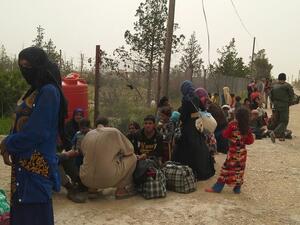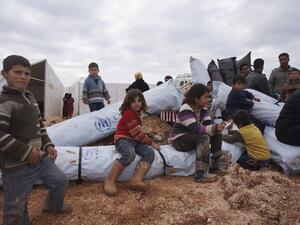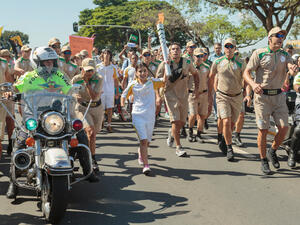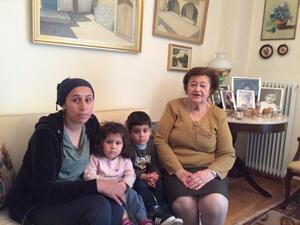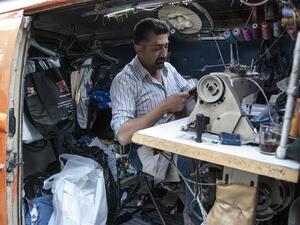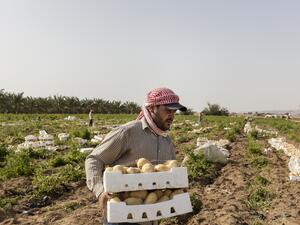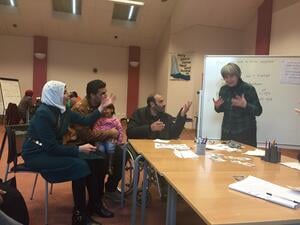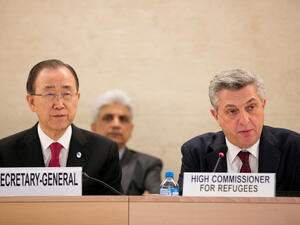Syria refugee outflow continues, squeeze on space in schools
Syria refugee outflow continues, squeeze on space in schools
Lebanon
UNHCR is seeing an increase in the number of Syrian refugees arriving in eastern Lebanon's Bekaa valley, with local charities and authorities reporting about 2,200 people settling in the east over the past week - almost double the recent weekly average.
In northern Lebanon the arrivals rate remains steady at about 400 people arriving every week. UNHCR is adding new telephone hotlines to help the increasing number of refugees seeking to register. The tense security situation in Tripoli last week meant many refugees were unable to make their registration appointments. The centre is now open and operations have returned to normal.
UNHCR is also monitoring the situation for refugees in the northern border area of Akkar, which is still affected by shelling from the Syrian side of the border. The villages of Al-Nura and Debbabiyeh, which host more than 80 refugees, saw nearby shelling in recent days.
Across Lebanon, the squeeze on shelter remains one of our biggest concerns with many refugees still staying in schools that are supposed to open in a week or two for the new school terms. Twenty families were evicted from a school in al-Marj, west Bekaa, earlier this week but were allowed to extend their stay following intervention by UNHCR, our NGO partners, and the Ministry of Social Affairs. We continue to search for alternative shelter for refugees staying in schools, and are running a hotline for refugees who are coming under pressure to vacate. So far, we've received 20 reports of refugees being pressured to leave. We are monitoring these cases and asking for understanding by local school authorities to avoid Syrians being evicted.
Last week we submitted to the authorities a list of 11 abandoned buildings we propose to refurbish to house refugees. So far we have received permission to use three of these and are waiting for further approvals for the renovations. We hope the government can expedite the remaining approvals.
In the North, preparations are underway to relocate refugees to an abandoned private school in Tekrit. Our shelter strategy in Lebanon includes a mix of refurbishing buildings to house Syrians and offering cash for shelter grants for the most vulnerable.
Turkey
In Turkey, two more refugee camps have been opened in the last week to accommodate new refugee arrivals. Together, the new camps can host 23,000 refugees. Another three camps with capacity to accommodate 10,000 refugees each are due to open in September. A number of refugees who are currently staying in schools, dormitories and gyms in seven cities in the south of Turkey will be transferred to the new camps, and these camps will also receive newly arriving refugees as they are transferred from the border.
The government is now hosting 80,410 people in 11 camps and schools in the border provinces of Hatary, Gaziantep, Kilis, Sanliurfa, Kahramanmaras, Adana, Osmaniye, Malatya and Adiyaman.
We understand from the Turkish authorities that a further 8,000 people were waiting as of yesterday to be admitted across the border gates of Oncupinar/Kilis and Hatay/Reyhanli. Local authorities have informed UNHCR that the border is not closed and that people are being admitted in smaller groups.
Meanwhile, UNHCR is continuing to support the government in hosting refugees by providing tents and other relief items. A UNHCR airlift carrying 600 tents arrived at Adana airport on Tuesday, adding to the thousands of tents and relief items UNHCR has already provided since August last year.
Syria
In Syria, UNHCR has received lists from authorities specifying which of the schools accommodating people displaced by the conflict will continue to shelter families once the academic year begins in mid-September, along with alternate public premises for use by people (refugees included) currently sheltering in schools. Our office in Syria plans to undertake urgent work on buildings that can be used as communal shelters to allow displaced to move out of schools before 16 September.
Yesterday, UNHCR staff visited eight shelters in three neighbourhoods of rural Damascus and confirmed pressing needs for sanitation, bedding, water and food. UNHCR continues to distribute relief items and financial support to the displaced through the Syrian Arab Red Crescent. Hundreds of mainly Iraqi refugees continue to approach our office on a daily basis seeking food assistance, medical help, registration or documentation, resettlement, and to report protection problems.
Iraq
We've seen an increase in the number of Syrians fleeing to Kurdistan in Iraq over the past two weeks, with 2,784 people crossing the border. There are now 18,682 Syrian refugees in Iraq. Large- scale destruction and indiscriminate bombardment in Damascus and its suburbs were reported as key reasons for flight. People fleeing Qamishli said the capacity to accommodate IDPs in the area is overstretched. People are sheltering in schools and mosques.
The Al-Qaem border crossing point is still closed and UNHCR continues to advocate with the government to reopen it. The Al-Waleed and Rabia border points remain open. At the same time, Iraqi refugees continue to return to Iraq from Syria due to deteriorating security. To date, 31,459 Iraqis have returned to Iraq since the escalation of the Syria conflict. The main needs of Iraqis returning to Syria are documents (including national IDs), shelter, food, healthcare, cash and jobs. There are many medical cases among the returning refugees, particularly amongst children, including the need for trauma counseling resulting from violence in Syria, and property left behind when fleeing.
Jordan
An average 1,400 Syrians per day have been arriving at the Za'atri camp in Jordan over the past week bringing the total number who have been received in the camp to about 23,400. In addition, some 200 Syrians elected to return to Syria on Wednesday after signing voluntary repatriation forms prepared by the government. According to local authorities, some 1,700 Syrians have returned voluntarily over the past six months.
UNHCR and its partners are working hard to expand the camp to receive more arrivals, and to improve conditions. We have started building community kitchens so that refugees can receive dry rations and cook their own food. On Monday, a convoy of trucks from our stockpiles in Dubai will bring more tents, mattresses, blankets and other relief items.
Europe
Outside the immediate Syria region, some refugee arrivals have been seen further west in Europe, although numbers are still relatively low. Sweden has the highest reported increase with 2,911 Syrians having sought asylum since January, compared to 640 in all of 2011. Other countries report a small increase in numbers. In France, 255 Syrians applied for asylum between January and July 2012, representing a fraction of the 50,000 asylum applications filed last year.
Elsewhere, the upwards trend is slight only: Although figures are incomplete, the average monthly influx of Syrian asylum applicants in the first months of 2012 shows 43 arrivals in Belgium (41 in 2011), 317 in Germany (220 in 2011), 85 in Switzerland (57 in 2011), 68 in the United Kingdom (41 in 2011), and 50 in Italy (40 in 2011).
Statistics
The total number of Syrian refugees registered or awaiting registration as of August 29 was 228,976.
Jordan
Total registered = 72,402 {including 26,291 awaiting registration}
Lebanon
Total registered = 57,482 {including 15,533 awaiting registration}
Iraq
Total registered = 18,682 {including 4,693 awaiting registration}
Turkey
Total registered = 80,410 {registered and assisted as per Government statistics}
For further information on this topic, please contact:
- In Amman: Ariane Rummery on mobile + 962 796552045
- In Geneva: Adrian Edwards on mobile +41 79 557 9120
- Sybella Wilkes on mobile +41 79 557 91 38
- In Paris: William Spinder on mobile +33 6 23 16 11 78

